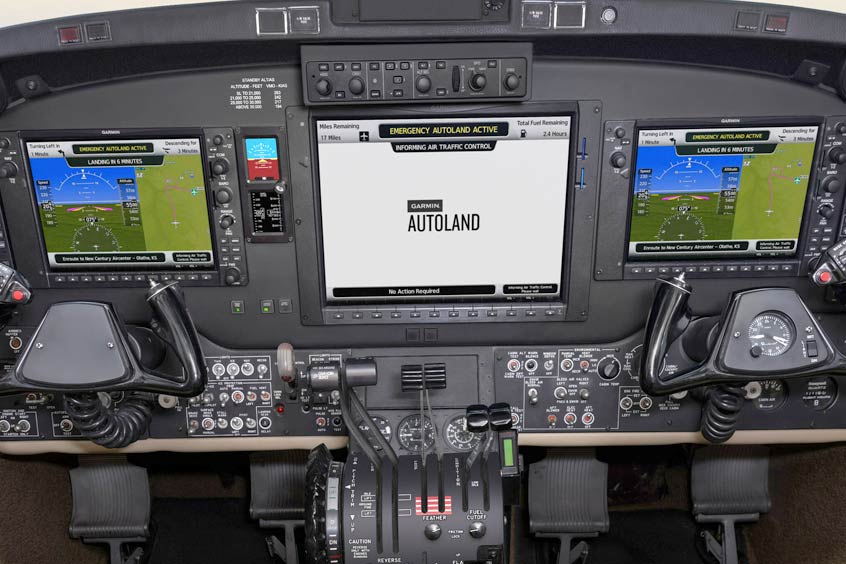 The monthly news publication for aviation professionals.
The monthly news publication for aviation professionals.

Garmin has achieved Federal Aviation Administration (FAA) certification to bring its Garmin Autoland and Garmin Autothrottle to the retrofit market, starting with select G1000 NXi-equipped King Air 200 series aircraft, and soon after, select King Air 300 series.
This year marks the 50th anniversary of the King Air 200, and the latest Garmin safety-enhancing technology is now available to this venerable aircraft. The certification marks the first time Garmin Autoland and Autothrottle have been offered as a retrofit solution, as well as the first certification with G1000 NXi. Full Autothrottle integration with the G1000 NXi reduces crew workload in the cockpit by managing aircraft speed and power and provides engine protection against potential engine exceedances. In the event of an emergency where the crew can no longer perform their duties, Garmin Autoland can control and land the aircraft without human intervention.
“Bringing Garmin Autoland and Autothrottle to the Beechcraft King Air, and for the first time to the aftermarket, is a tremendous step toward transforming the general and business aviation fleet with safety-enhancing autonomous technologies. The G1000 King Air retrofit programme was launched in 2007, initially on the King Air C90, with now over 800 G1000 retrofits in the King Air fleet. We are pleased to provide these operators an upgrade path to Autoland and Autothrottle, demonstrating our deep commitment to developing and continually supporting G1000 and our customers that have trusted us with this investment in their aircraft,” says Phil Straub, Garmin executive VP and MD, aviation.
Garmin's Autothrottle will now be offered as a retrofit solution in the King Air, providing extensive safety-enhancing features and greatly reducing workload in the busy King Air cockpit. Autothrottle is fully integrated with the G1000 NXi system and provides automatic control of the engine power levers from takeoff to landing. Autothrottle keeps power levers in the proper power setting, negating the threat of a possible throttle rollback. Power settings are based on manufacturer or user-configurable climb, cruise and descent schedules, including ITT limits. Additionally, Garmin Autothrottle provides ITT and torque protection by reducing power when the system senses potential overtemperature or overtorque conditions.
Autothrottle will also activate automatically in the event of an aircraft overspeed or underspeed situation and takes into account flap and gear position, providing additional peace of mind for pilots operating the aircraft. If Autothrottle detects an engine failure, it automatically sets the power lever on the failed side to a fixed position and adjusts the operative throttle lever to maintain the selected airspeed reference.
With family, friends or business colleagues on board, a pilot's top priority is keeping everyone safe. Now there is a way to provide even more protection in this popular aircraft: the award-winning Garmin Autoland system. Autoland determines the most optimal airport and runway, considering factors such as weather, fuel on board, runway surface and length, terrain, obstacles and more. In the event of an emergency, passengers can activate Autoland by the press of a button, located in the back of the centre pedestal for easy access. Autoland will activate automatically if the system determines it's necessary.
Once activated, the system calculates a flight path to the most suitable airport, initiates an approach to the runway and automatically lands the aircraft. The system takes into consideration a breadth of information and criteria and will automatically communicate with air traffic control (ATC) throughout the entire event, advising controllers and pilots operating near the aircraft of its location and intentions.
Throughout an Autoland activation, the system provides simple visual and verbal communications in plain language, so passengers have the information and know what to expect. The flight displays show the aircraft's location on a map alongside information such as the destination airport, estimated time enroute, distance to the destination airport and fuel remaining. Airspeed, altitude and aircraft heading are labelled in an easy-to-understand format and passengers also have the option to communicate with ATC by following instructions on the multi-function display.
At any time, a pilot can easily deactivate Autoland with a single press of the “AP” autopilot key on the autopilot mode controller or the autopilot disconnect button on the yokes. The flight display shows a message that confirms Autoland has been deactivated and in the event of an accidental deactivation, the system shows passengers how to reactivate Autoland if needed.
During an Autoland activation, the Garmin Autothrottle system is used to automatically manage aircraft speed and engine power so the aircraft can climb, descend or maintain altitude as needed. If temperatures are conducive to ice accumulation, Autoland activates anti-ice and deice systems for the engines and control surfaces. On approach to landing, the system initiates a controlled descent to the airport. If the aircraft needs additional time to descend or slow down during the approach, the Autoland system initiates a standard holding procedure. Once Autoland configures the landing gear and flaps, the aircraft begins its descent to the runway and lands. On the runway, automatic braking is applied while tracking the runway centreline to bring the aircraft to a complete stop. Engine shutdown is also automated so occupants can safely exit the aircraft.
With the latest G1000 NXi upgrades, King Air owners can take advantage of additional features. Synthetic Vision Technology (SVT) has been upgraded to now include a 3D exocentric view of the SafeTaxi airport environment to aid situational awareness while taxiing. SVT also displays 3D building footprints including hangars, terminals and towers, taxiways, aprons, signs and other markings to help reduce runway incursions by providing guidance while taxiing at airports contained in the SafeTaxi database. These SVT updates also increase topographical clarity, sharpened water and terrain boundaries, improved obstacle and powerlines display, enhanced runway and airport sign depiction and more.
Additionally, Garmin's recently announced PlaneSync connected aircraft management system will simplify the lives of King Air 200 owners and operators by automating database updates, providing real-time remote aircraft status and automatically transmitting flight log and engine data to the cloud after landing. The system also includes Emergency Descent Mode (EDM) as a standard feature that is enabled automatically, in the event of a loss in aircraft pressurisation.
Adding on to Garmin's revolutionary electronic stability and protection (ESP) technology, one engine inoperative ESP assists the pilot in maintaining control in the event of a single engine failure. ESP pitch and roll limits will adjust to prevent excessive pitch or bank angles while the pilot performs single engine procedures.
Garmin Autoland and Autothrottle are planned to be available in the third quarter of 2023 for retrofit installations through the approved Garmin authorised dealer network for King Air 200 G1000 NXi installations. Garmin Autoland and Autothrottle are expected to be available for King Air 300 series aircraft in 2024. Garmin Autoland is certified on the G3000-equipped Piper M600 SLS, Daher TBM 940/960 models and the Cirrus SF50 Vision Jet. Future certifications of Garmin Autoland have also been announced for the G3000-equipped Beechcraft Denali and HondaJet Elite II aircraft.